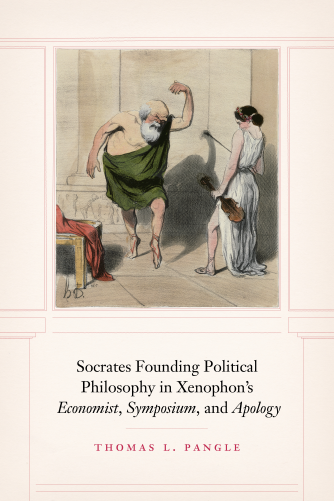• Home | • Curriculum Vitae: » PDF | • Return to Books & DVD


Socrates Founding Political Philosophy in Xenophon's Economist, Symposium, and Apology
University of Chicago Press, 2020
This book shows how the presentation of Socrates in Xenophon's highly defensive Memorabilia is decisively deepened as well as complemented by the less apologetic, more aggressive shorter writings that Xenophon devoted to portraying Socrates in action.
Xenophon's Economist exposes and focuses upon something scandalous about Socrates that one would never guess from reading the Memorabilia: well into his maturity, the philosopher by his own confession neither practiced nor understood "virtue" (aretē). Xenophon makes us witnesses to a dialogue where Socrates tells of the great day on which he underwent a radical transformation—when he became the moral and political citizen-philosopher famous to posterity, from having previously been a pre-Socratic thinker lost in the clouds, "reputed to engage in idle chatter and to measure the air," who by his own confession had no clue as to the meaning of the "noble/beautiful" (kalon), or as to what "gentlemen"—the "noble-and-good"—are and do.
Xenophon's Symposium lets us be "flies on the wall" at a private drinking party at which the character of Socrates, and of his not altogether harmonious circle, find expression through being portrayed as partaking in the playful posturing of conventional gentlemen in their cups. Gradual inebriation loosens the tongues of all present, including Socrates, making manifest the gulf—and how that gulf is tenuously bridged—between the erotic playfulness of conventionally respectable gentlemen (led by the famous, wealthy, and "upper-crust" Kallias) and the philosophically erotic playfulness of Socrates.
Xenophon's Apology of Socrates to the Jury gives us access to the inner deliberation by which Socrates arrived at his decision to give the astonishingly arrogant speech that he offered at his trial. Through an account of a crucial private conversation prior to the trial, in which Socrates reveals his plan for the conduct of his defense, and then through selections from Socrates's defiantly offensive courtroom oration, in which he provocatively proclaimed the excellences that made him superior to his fellowmen, Xenophon brings to light Socrates's distinctively philosophic self-esteem.
Xenophon's Economist exposes and focuses upon something scandalous about Socrates that one would never guess from reading the Memorabilia: well into his maturity, the philosopher by his own confession neither practiced nor understood "virtue" (aretē). Xenophon makes us witnesses to a dialogue where Socrates tells of the great day on which he underwent a radical transformation—when he became the moral and political citizen-philosopher famous to posterity, from having previously been a pre-Socratic thinker lost in the clouds, "reputed to engage in idle chatter and to measure the air," who by his own confession had no clue as to the meaning of the "noble/beautiful" (kalon), or as to what "gentlemen"—the "noble-and-good"—are and do.
Xenophon's Symposium lets us be "flies on the wall" at a private drinking party at which the character of Socrates, and of his not altogether harmonious circle, find expression through being portrayed as partaking in the playful posturing of conventional gentlemen in their cups. Gradual inebriation loosens the tongues of all present, including Socrates, making manifest the gulf—and how that gulf is tenuously bridged—between the erotic playfulness of conventionally respectable gentlemen (led by the famous, wealthy, and "upper-crust" Kallias) and the philosophically erotic playfulness of Socrates.
Xenophon's Apology of Socrates to the Jury gives us access to the inner deliberation by which Socrates arrived at his decision to give the astonishingly arrogant speech that he offered at his trial. Through an account of a crucial private conversation prior to the trial, in which Socrates reveals his plan for the conduct of his defense, and then through selections from Socrates's defiantly offensive courtroom oration, in which he provocatively proclaimed the excellences that made him superior to his fellowmen, Xenophon brings to light Socrates's distinctively philosophic self-esteem.

